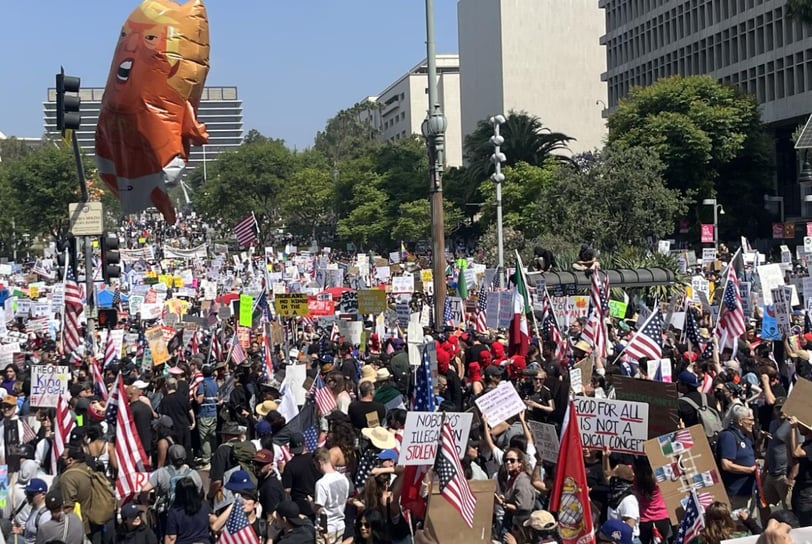"No Kings" Rallies Ignite America: A Stand for Democracy in 2025
6/17/20254 min read


"No Kings" Rallies Ignite America: A Stand for Democracy in 2025
Introduction: A Nationwide Call to Action
On June 14, 2025, the streets of America pulsed with energy as millions rallied under the banner "No Kings," a powerful rejection of perceived authoritarianism in U.S. politics. From bustling cities like Philadelphia to smaller towns like Mobile, Alabama, nearly 2,100 protests unfolded, drawing an estimated 4 to 13 million participants. Organized by a coalition of progressive groups, these rallies countered a controversial Trump-led military parade in Washington, D.C., marking his birthday. This blog post explores the origins, scale, and significance of the "No Kings" movement for InsightOutVision.com’s News and U.S. News & Politics audience, offering a clear, engaging look at a defining moment in American civic engagement.
The Spark Behind "No Kings"
The "No Kings" rallies were born from growing concerns about concentrated executive power, particularly tied to the policies of the Trump administration. Groups like Indivisible, the 50501 Movement, the ACLU, and the Service Employees International Union (SEIU) led the charge, framing the protests as a defense of democratic principles. The slogan, rooted in America’s revolutionary rejection of monarchy, resonated deeply, with Pennsylvania Lieutenant Governor Austin Davis declaring, “America hasn’t had a king in 250 years, and we aren’t going back now.”
The rallies were strategically timed to coincide with a Trump-organized parade, which critics on X described as a “military exploitation birthday party.” Organizers saw this as a symbol of authoritarian overreach, galvanizing a response that united diverse groups—progressives, veterans, labor unions, and faith communities—under a shared commitment to checks and balances.
A Nationwide Wave of Protests
The scope of the "No Kings" rallies was staggering. Protests spanned all 50 states, with major hubs like Philadelphia (80,000–100,000 attendees), Chicago (15,000+), and Los Angeles expecting “unprecedented” turnout. Smaller communities, from Greensburg, Pennsylvania, to Tucson, Arizona, also hosted events, showcasing the movement’s grassroots reach. Organizers leveraged digital tools, with websites like those shared by@AZ_Brittney providing interactive maps to help people find local rallies.
The protests were largely peaceful, though isolated incidents in Los Angeles and San Francisco required heightened security. In Texas, a “credible threat” led to the evacuation of the State Capitol, highlighting the charged atmosphere. Remarkably, the movement extended beyond U.S. borders, with solidarity protests reported in Europe, Asia, and Africa, signaling global resonance.
Funding the Movement: A Blend of Grassroots and Institutional Support
The scale of the rallies raised questions about funding. The organizing coalition, including 501(c)(4) nonprofits like Indivisible and Public Citizen, relied on a mix of small-dollar donations, foundation grants, and union resources. Indivisible’s 2023 tax filings show over $7 million in revenue, largely from individual donors and progressive foundations, which likely supported logistics like permits, security, and promotion. The SEIU, with its multimillion-dollar budget from member dues, also played a key role in mobilizing workers.web:unavailable
Some X posts, like those from@RYboating, speculated about elite funding, calling for investigations into the No Kings organization’s backers. Others, like@DanielMeier_, suggested ties to groups like the Planned Parenthood Action Fund, though no direct evidence confirms this. Organizers emphasized grassroots contributions, with crowdfunding efforts covering costs for smaller events, ensuring broad accessibility. The lack of full transparency, typical for 501(c)(4)s, fueled debate but didn’t overshadow the movement’s impact.post:unavailable
Public Sentiment: Passion and Polarization
The rallies sparked a spectrum of reactions. Supporters, including journalist Jim Acosta and Indivisible’s Ezra Levin, praised the movement as a vital stand for democracy. On X, users like@TruthWill_Reign tied the protests to constitutional values, citing Article I, Section 9’s prohibition on titles of nobility. Celebrities and influencers, such as@paulapoundstone, amplified the call to action, boosting visibility.
Critics, however, were vocal. Some, like@TrueNorth444
, warned of “riots” orchestrated by progressive groups, framing the rallies as disruptive. Others questioned the movement’s motives, alleging partisan agendas or foreign influence, though these claims lack substantiation. Mainstream media, including Reuters, highlighted the protests’ scale and peaceful nature, framing them as a significant response to political polarization.
Why "No Kings" Matters
The "No Kings" slogan struck a chord by invoking America’s founding ethos: resistance to unchecked power. For many, the rallies were a personal stand against voter suppression, judicial overreach, and the politicization of institutions. The movement’s diversity—spanning ages, races, and regions—underscored its broad appeal, uniting people around shared democratic ideals.
The protests also highlighted the power of collective action. By mobilizing millions, the coalition demonstrated that grassroots energy, amplified by strategic organization, can challenge entrenched power. The absence of a major D.C. rally, a deliberate choice to avoid confrontation, showed tactical restraint, focusing resources on local impact.
Challenges and Criticisms
Coordinating 2,100 events was a logistical feat, requiring extensive planning for permits, safety, and outreach. Organizers faced criticism over funding transparency, with some X users alleging hidden elite backing. Others worried the protests could deepen division, especially in areas with counter-demonstrations. Despite these challenges, the largely peaceful outcome reflected disciplined organization and community commitment.
The Road Ahead
The "No Kings" rallies may mark a turning point for civic activism. Organizers are already planning next steps, including voter mobilization and advocacy for democratic reforms. The movement’s global reach suggests potential for broader coalitions, but sustaining momentum will require addressing funding concerns and maintaining inclusivity.
Conclusion: A Defining Moment
The "No Kings" rallies of June 14, 2025, were a bold assertion of democratic values, uniting millions against perceived threats to America’s system of governance. They showcased the power of collective action and the enduring relevance of the nation’s founding principles. As the U.S. navigates a polarized landscape, these protests remind us that democracy thrives on active participation.
Thought-Provoking Questions for Readers:
How do the "No Kings" rallies reflect broader concerns about democracy in the U.S. today?
Can large-scale protests like these bridge divides or risk further polarizing communities?
What role should grassroots movements play in shaping policy in a politically charged era?
Explore deep insights on current events and growth.
Vision
Truth
hello@insightoutvision.com
+1-2236036419
© 2025. All rights reserved.
